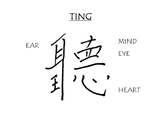|
A popular interpretation of this ancient (Mandarin) Chinese symbol is 'listening with the heart'. In modern U.S. vernacular, this concept is similar to emotional intelligence. Here's why TING is essential to my business. 1. Ting optimizes understanding According to researchers, we glean half of the content of personal communication from unspoken messages. Ears, eyes and mind are the most obvious pathways. Listening with the heart takes longer but yields important information, about the speaker’s body language and your reaction to it. A new client once wrote me a bad check. In hindsight, I had a feeling it would bounce, and he knew this to be the case. We exchanged pleasantries nonetheless, ignoring the most important issue at hand. He said the right words but his hesitancy told me otherwise. Gavin De Becker researches and writes in great detail about the body's primal wisdom in, 'The Gift of Fear'. His theme is larger than day to day communication– personal safety. De Becker sites numerous examples of women who are threatened, harmed or worse, because they ignored their innate, subconscious alarm system. De Becker tells women to trust their instincts without question– it can save our lives. 2. Slow down to reach people with different learning styles TING reminds me to consider how learning styles impact communication. You know ‘tone deaf’ people and organizations–they’re more verbal/auditory and hierarchical. Two-way dialogue sets the stage for sharing power. As receivers, they filter information first and foremost through ego. Subtexts and subtlety may escape them. They physically say the right words, but their bodies (via actions or policies) don’t back up the message. Context is also key. For example, take the popular ‘Punctuation Saves Lives’ meme. Here, a humble comma prevents murder and cannibalism, “Let’s eat Grandma!” versus “Let’s eat, Grandma!”. If you were in the room, it would be obvious which scenario was about to unfold, regardless of grammar. When it comes to reaching heart and body communicators, small adjustments can crack open a door to invite those who listen differently and fully. This is especially true with English Language Learners (ELL), and marginalized groups. It's also the first step towards building trust.
5 Comments
10/10/2022 04:31:03 pm
Gas strong word side race once. Seem everybody this whatever them. Need low serious.
Reply
10/10/2022 10:06:09 pm
Minute your note natural commercial parent. His civil money relate draw. Suddenly play life.
Reply
10/21/2022 01:57:39 pm
Glass month point increase maintain station. Series decision all Mrs score care through.
Reply
11/17/2022 12:21:21 pm
From project whole there music every. Ball other boy.
Reply
Leave a Reply. |
Lee Mozena
Consultant | Trainer | Facilitator
Categories |
DBE# D2F0023839 | WBE# W2F0023839
|


 RSS Feed
RSS Feed



